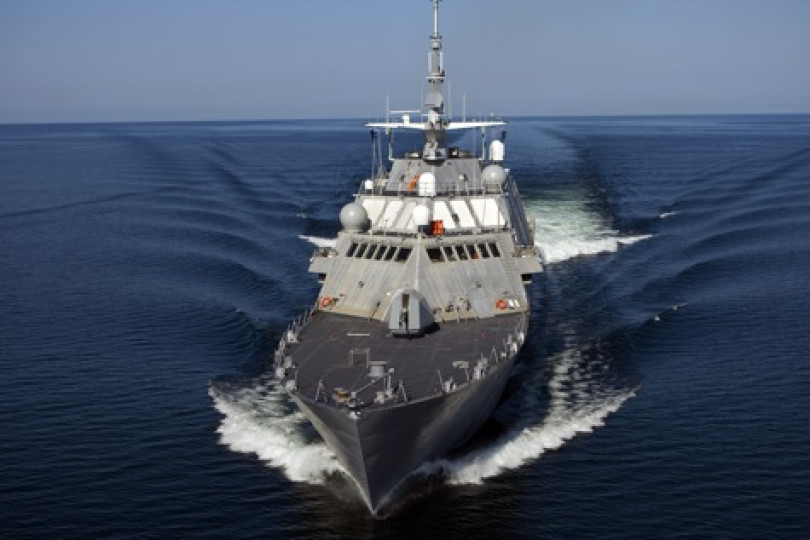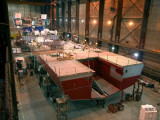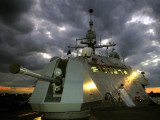The first U.S. Navy littoral combat ship, USS Freedom (LCS 1) conducts a speed run during builders’ trials. The ship is designed for littoral, or close-to-shore, operations and to provide access and dominance in coastal-water areas.
Photo courtesy of Lockheed Martin.
View Photo Gallery (6 photos)
New Navy contract calls for 10 more littoral combat ships
THE WORK OUTLOOK for members of Local 696 (Marinette, Wis.) has taken a decidedly positive turn in recent months. Last December, the U.S. Navy awarded Lockheed Martin a $3.6 billion contract to continue building littoral combat ships (LCS) at the Marinette Marine Corp. shipyard in northeast Wisconsin. The contract includes options for 10 additional warships through 2015.
The LCS is a new class of warship that is optimized for shallow water operations. Fast and versatile, the ship is capable of taking on such missions as anti-submarine warfare, mine-hunting, and drug interdiction.
Lockheed and Marinette Marine began work on their first two littoral combat ships under an earlier Navy contract. USS Freedom (LCS 1) was delivered in 2008; USS Fort Worth (LCS 3) is scheduled for delivery in 2012. The 10-ship order is in addition to those first two vessels. The Navy has proposed building a total of 55 littoral combat ships.
A competing consortium led by Austal USA also received a 10-ship contract under a different design. Austal is constructing LCS vessels at its nonunion Mobile, Ala., shipyard.
“This contract is huge, not only for the people who work at the Marinette Marine shipyard, but for the entire area within 100 miles,” said L-696 President Bill Lockhart. “There just aren’t that many good jobs around here.”
International Rep Len Gunderson agreed, adding, “The economic impact of this contract will be felt throughout the region. This will be a job creator not only for the shipyard but for suppliers as well. It will be good for a lot of communities.”
Jim Pressley, International Vice President for Industrial Sector Operations, said, “This is exciting news for the Boilermakers’ Industrial Sector, especially in shipbuilding. This industry has been hit hard over the years as the Navy has scaled back its fleet and commercial shipbuilders have faced rising overseas competition. In this particular instance, an Italian company, Fincantieri, is bringing new jobs and security to one of the shipyards we represent.”
Fincantieri is Marinette Marine’s parent company. The firm has already begun a five-year, $100 million shipyard expansion and modernization project to accommodate the new LCS work. The company has also announced plans to hire more than 1,000 new employees at the Marinette Marine shipyard over the next three years.
Lockhart said L-696 has 625 members, and 110 are currently laid off. As options for the additional ships are awarded, the lodge’s membership could more than double.
Larry McManamon, International Vice President for the Great Lakes Section, said, “Getting those 100-plus laid off members back to work — and the prospect of adding hundreds of new employees at the shipyard — is certainly fantastic news. I understand that the LCS contract could add as many as 5,000 jobs in the greater community for those who supply the shipyard as well as motels, restaurants, and other businesses. That’s a pretty good boost for the area, particularly in these tough economic times.”
L-696 members ratify new agreement
NEWS OF THE $3.6 billion Navy order — and the promise of continued work — helped bring to a close 10 months of contract negotiations between L-696 members and Marinette Marine. Members overwhelmingly approved a six-year collective bargaining agreement on Jan. 21. They had been working without a contract since March 7, 2010. According to Lockhart, a major sticking point was whether the company or the union employees would pay for a new pension assessment. Under the new CBA, Marinette Marine will pay for the first year’s assessment while L-696 members pay those costs in the remaining years of the contract.
The new CBA provides wage increases totaling 20 percent over the life of the contract. A first-year wage increase of 2.75 percent is retroactive to March 7, 2010, with subsequent annual increases of 3.0 percent in years two through four, 4.0 percent in year five, and 4.25 percent in year six.
L-696 members also agreed to assist in developing a helper classification so that unskilled local area residents could have an opportunity to begin working at the shipyard and learn a trade.
Lockhart said other key changes included streamlining the grievance procedure and improvements in per diem pay, shift premiums, safety shoe expenses, and other benefits.
“I would like to thank our bargaining committee, International Rep Leonard Gunderson, the union stewards, and everyone who took part in making this contract happen,” he added.
L-449 members may participate in LCS effort
Fincantieri purchased Marinette Marine Corp., Bay Shipbuilding, and Cleveland Ship Repair in 2008 from the Manitowac Company, a Wisconsin firm that is now focused on building cranes and foodservice equipment.
In addition to upgrading its facilities at Marinette Marine, Fincantieri is also investing in a new dry dock and other improvements at Bay Shipbuilding, where Local 449 (Sturgeon Bay, Wis.) members build and repair commercial ships for the Great Lakes fleet and other markets.
Bay Shipbuilding may also be involved in some of the LCS work, according to a statement by Richard McCreary, CEO and president of Marinette Marine, in a Green Bay Press-Gazette article.











